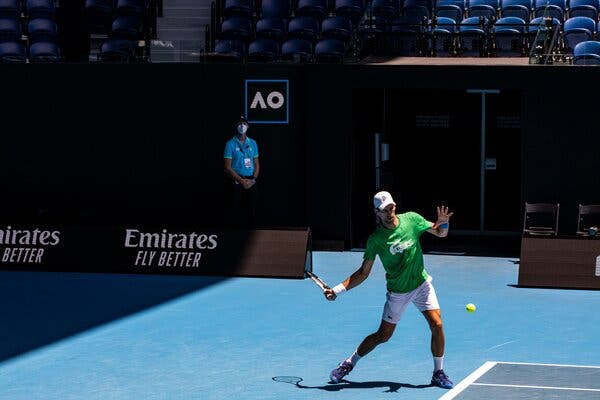Novak Djokovic, the Serbian tennis star, had his visa revoked for a second time by the Australian authorities on Friday, four days after winning a legal victory freeing him from immigration detention, adding another dizzying volley in a drawn-out drama over his refusal to be vaccinated for Covid-19.
Australia’s immigration minister, Alex Hawke, said in a statement that he was canceling Djokovic’s visa on the grounds of “health and good order,” adding that it was in the public interest to do so.
He offered no further details about his decision to revoke the visa, other than to say that the Australian government was committed to protecting the country’s borders during the pandemic.
A federal investigation led by Hawke had revealed that Djokovic provided false information on the documents he gave to border officials when he tried to enter the country last week.
Those documents failed to state that Djokovic, who lives in Monte Carlo, had traveled between Serbia and Spain during the 14 days ahead of his arrival in Australia.
In a post on social media on Wednesday, Djokovic acknowledged the misstatements and addressed questions about his movements in the days before and after his positive test for the coronavirus on Dec. 16. That test result allowed him to gain an exemption from state health officials in Victoria to play in the Australian Open.
Djokovic’s statement read as both a desperate request for leniency and an explanation for irresponsible behavior by a star athlete unaccustomed to being held accountable. He said that a member of his support team had made a “human error” when filling out his paperwork. He also said he had made a poor decision to go through with an in-person interview and photo shoot with a French sports publication after testing positive for the coronavirus.
Franck Ramella, a reporter with the French sports newspaper L’Equipe, wrote this week that when he conducted the interview on Dec. 18, he didn’t know that Djokovic had just recently tested positive for the coronavirus.
Djokovic said he was not yet aware that he had tested positive when he attended a tennis event on Dec. 17 in Belgrade, the Serbian capital, where he presented awards to children. But the record of his positive test shows that he took the test at 1:05 p.m. on Dec. 16 and received the positive result seven hours later.
“I just want to have the opportunity to compete against the best players in the world and perform before one of the best crowds in the world,” Djokovic said in the post.
Earlier this week, it appeared that Djokovic would be able to do that, even though he would most likely be the only unvaccinated player in the men’s tournament.
On Monday afternoon, a judge found that Djokovic had been treated unfairly upon his arrival late on Jan. 5 at a Melbourne airport, where he was questioned for hours and denied a promised chance to contact his lawyers or Australian Open officials.
The judge ordered that Djokovic’s visa be restored, freeing him from the hotel for refugees and asylum seekers where he had been held for five days and clearing a path for him to compete for a record 21st Grand Slam tournament title.
Australian tennis officials had granted Djokovic the vaccination exemption, in consultation with state officials, to play in the tournament, which begins on Monday in Melbourne. But border officials canceled his visa with the support of Prime Minister Scott Morrison, saying that Djokovic remained subject to a requirement that everyone entering the country be fully vaccinated.
The court ruling did not put an end to the case, but rather shifted its focus to Djokovic’s supporting documents, the legitimacy of his coronavirus test and basic questions about what Djokovic knew about his diagnosis and when he knew it.
Legally, Hawke, the immigration minister, can cancel a visa on character grounds or if he finds records to be false, or if he believes the visa’s recipient poses a health or safety risk. Hawke made his decision as Australia is in the midst of its worst bout with the coronavirus.
By moving to revoke Djokovic’s visa a second time, the Morrison government showed that it viewed his expulsion as a national priority, worth the risk of international criticism for what will look to some like political opportunism before an election and a refusal to accept a legal defeat.
Mike Ives contributed reporting.


























